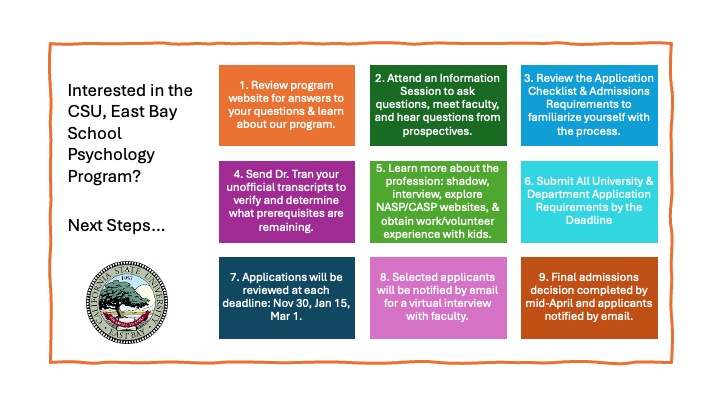Prospective Students & Application Process
-
Thursday, 9/11/25: 4:00-5:00pm
Monday, 9/22/25: 5:00-6:00pm
Friday, 10/10/25: 12:00-1:00pm
Thursday, 10/30/25: 5:00-6:00pm (postponed to 11/19/25: 5:00-6:00pm)
Wednesday, 11/5/25: 4:30-5:15pm (Meet with Current Students for Q & A session)
Thursday, 11/13/25: 5:00-6:00pm
Friday, 12/5/25: 12:00-1:00pm
Thursday, 02/12/26: 4:00-5:00pm
Virtual University Graduate Fair
Thursday, 03/12/2026: 12-1:00pm
Zoom Link Friday, 04/17/26: 12-1:00pm
*Times are PST.
Information sessions are opportunities to learn more about our program, the application process, and meet with faculty/current students. This is a great way to strengthen your application.
-
The following are Program Application Requirements:
- Bachelor’s degree from an accredited university
- Cumulative undergraduate GPA of 3.0
- University Application (via Cal State Apply with nonrefundable $70 fee by the deadline)
- Department Application (submit after completing the Cal State Apply application and by the deadline). Attach your resume, statement of purpose, prerequisite verification letter from the Program Coordinator (optional), and all copies of transcripts to the Department Application.
- Prerequisites: Five (5) prerequisites are required as part of the application. These courses must be completed with a grade of “B” or better prior to starting the program in the fall semester (if admitted). Prerequisites are intended to provide a foundational understanding and readiness for graduate coursework and field experiences.
- Theories of Learning Behavioral or Cognitive Psychology or Conditioning and Learning or Applied Behavior Analysis
- Statistics
- Abnormal Psychology
- Human, child, or Adolescent Development
- Psychological Tests OR Research Design
*Prior to submitting your Department Application, you can send your unofficial transcripts with posted grades to the Program Coordinator, Dr. Tran (oanh.tran@csueastbay.edu) for review and verification of your prerequisites. Be sure to submit ALL your transcripts together, as only one letter/review will be provided per academic year.
- Basic Skills Requirement (BSR) – As of July 1, 2024, a bachelor’s degree or higher from a regionally accredited institution of higher education can serve as demonstration of basic skills in reading, writing, and mathematics.
- Official Transcripts: You are required to submit 2 sets of transcripts, from all undergraduate work to CSUEB. 1) Official transcripts are submitted to the University Admissions Department (see How to Submit Documents) and 2) Unofficial transcripts are submitted with the Department Application.
- Applicants with international transcripts with a foreign degree must provide an official evaluation of that coursework by World Education Services (WES).
- Statement of Purpose:This is an opportunity for the admissions committee to get to know you. Describe your professional goals. We are interested in knowing how you developed these goals and how you assess your strengths and weaknesses relative to achieving these goals. Be sure to discuss the program related questions in your statement of purpose. Do not use a generic statement of purpose.
The following are the statement of purpose questions for the School Psychology program application:
1) What brought you to the field of School Psychology?
2) What is the role of a School Psychologist and why do you want to be one?
3) How have you learned about what School Psychologists do?
4) How would you apply your knowledge to the profession?
5) What strengths will help you be a good School Psychologist and what challenges will you work on to reach your goals?
- Letters of Recommendation: Three (3) letters are required for the Department Application. Request letters from professional individuals who can speak on your academic performance and professional skills and abilities. At least one letter should be from a faculty/professor/instructor who can speak to your academic abilities since you are applying to an academic role.
- Resume: The resume is required and include your educational background and professional qualifications and experiences (about 2 pages, include the most relevant information as it relates to counseling and graduate level work).
- School-based experience/volunteer/community work with children and youth: Applicants will be committing to future work as a school psychologist in schools and communities with children and youth; therefore, some work experience or volunteer experience is important to help applicants better understand the interactions with this population (e.g., summer camp, after school program, paraprofessional, behavioral support, tutoring).
- Shadow/interview multiple school psychologists: It is strongly recommended for applicants to contact their local district to interview/shadow 2-3 school psychologists to better learn the role. This information will be discussed in the statement of purpose and interview.
- Attend an Information Session: Attend a virtual information session to learn more about the program and application process; meet faculty and ask questions; hear questions from other applicants; receive tips on the application.
- Do your homework/explore professional websites: Learn more about the profession by exploring the National Association of School Psychologists (NASP) and California Association of School Psychologists (CASP) websites. Learn more about our program by exploring the CSUEB School Psychology website. Demonstrate your preparedness for graduate level work. Program and student fit are reciprocal.
Both University and Department applications are required in order to be considered. ALL application requirements must be submitted by the deadline in which you would like your application reviewed.
-
Applicants must complete the following or equivalent prerequisite courses with a grade of B or better prior to starting the fall semester:
- Theories of Learning Behavioral or Cognitive Psychology or Conditioning and Learning or Applied Behavior Analysis
- Statistics
- Abnormal Psychology
- Human, child, or Adolescent Development
- Psychological Tests OR Research Design
Applicants who still need to take prerequisites should have a detailed plan for completion and noted on the department application. All prerequisites need to be completed prior to fall admissions; these courses cannot be taken concurrently while in the program.
Please refer to the Prerequisite Equivalency Course List to determine if your past courses and/or courses from other institutions fulfill these requirements. This is not an exhaustive list; these are only examples.
If your institution or course is not listed in the prerequisite course list, please contact the School Psychology Program Coordinator: Dr. Oanh Tran, oanh.tran@csueastbay.edu. Provide the course title, course description, course number, institution, and ALL unofficial transcripts.
You can also contact the program coordinator to inquire about prerequisites and equivalencies from your transcripts, and obtain a verification letter of prerequisite course approval. You can include this letter with the department application. This prior transcript review can help expedite the application review process. *If a course or transcript is from a foreign country, the transcript must reviewed by an approved CTC agency before contacting the Coordinator.
Prerequisite courses can be taken at any accredited college, university, or online program. It is the applicant's responsibility to research where prerequisites can be taken. If interested, CSUEB can be an option through the Psychology or Human Development Department. Contact them directly or look at the student registration information.
IMPORTANT:
To be accepted, the prerequisite course must have been completed within the last 10 years (date of admissions) to meet our recency requirement.
-
Application Review: The program is rolling admissions and therefore has three rounds of application reviews. The completed application and accompanying materials will be reviewed by the admissions committee after the application deadline at each round. If your application was not selected in the first round, your application will be moved to the next round of reviews. Applicants will be notified by email if your application was selected for the next step, interview with faculty.
Interview: Applicants selected for an interview will be notified by email with an interview time and zoom link. The interview is an hour long with two faculty members. Only selected applicants will be invited for a virtual interview with faculty.
Notification: Admitted applicants will be notified by email with an admissions offer. If your application was not selected for an interview or admissions, you will receive a denial email in early April.
Admitted Students: Candidates will receive an admissions packet via email with documents to review and sign to finalize their admission with the department. In addition, candidates are invited to attend a required Welcome Incoming Student orientation to meet the cohort, current students, and to receive information about the course schedule and other program orientations.
ACCEPTANCE TO THE SCHOOL PSYCHOLOGY GRADUATE PROGRAM IS ONLY MADE AFTER A REVIEW OF THE REQUIRED ADMISSIONS MATERIALS. AN APPLICATION TO OUR PROGRAM IS NOT AN AUTOMATIC ADMISSION.
-
CSUEB School Psychology program is renowned for several reasons:
-
Comprehensive Curriculum with Cohort Model: The program offers a well-rounded curriculum that integrates theoretical knowledge with practical application, ensuring students are successful within the cohort and are well-prepared for their careers.
-
Accreditation: CSUEB's School Psychology program is accredited by the National Association of School Psychologists (NASP) and CA Commission on Teacher Credentialing (CCTC), which assures the quality and rigor of the program.
-
Experienced Faculty: The faculty comprises experienced professionals and researchers who are dedicated to providing high-quality education and mentorship to students.
-
Field Experience: The program emphasizes extensive fieldwork and practicum opportunities, allowing students to gain hands-on experience in real-world settings under the supervision of licensed school psychologists and clinicians.
-
Social Justice, Diversity, and Inclusion: CSUEB is known for its commitment to social justice, diversity, and inclusion, creating an enriching learning environment that prepares students to be advocates and work effectively in diverse communities.
-
Student Support: The program offers strong support services, including advising, professional development workshops, and networking opportunities with alumni and professionals in the field.
-
Community Engagement: CSUEB fosters strong connections with local schools and community organizations, providing students with valuable opportunities to engage with and contribute to the community.
-
Research Opportunities: Students have access to various research opportunities, allowing them to contribute to the field of school psychology and stay updated with the latest developments and best practices.
- 3 in 1 Model for Career Opportunities: Upon successful completion of the program, graduates earn a Master's in Counseling Psychology, a PPS School Credential, and coursework and hours toward the Associate Marriage and Family Therapist (AMFT) Intern License with the Board of Behavioral Sciences (BBS).
- Graduates are eligible to apply to become Nationally Certified School Psychologists through NASP.
Overall, the CSUEB School Psychology program's combination of rigorous academic training, practical experience, and supportive learning environment makes us unique and offers graduates the skills and tools for success.
-
-
Our program is unique in that it is a 3:1 program. Our candidates graduate with: 1) a Master’s in Counseling Psychology, 2) a Credential in School Psychology, and 3) Coursework Training toward the Marriage and Family Therapy license. We also emphasize the importance of social justice work in our service to schools and the community. Our courses and training incorporate diversity and equitable practices for our candidates and the populations we serve. School Psychology candidates will achieve significant milestones each year in the program, and we celebrate these milestones as steps toward their professional and academic goals.
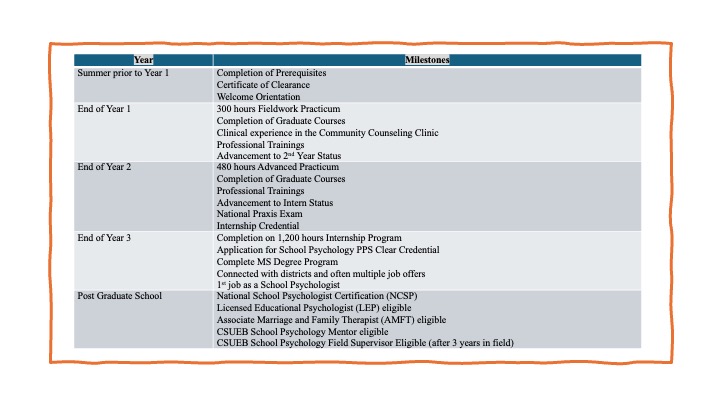
-
Full-Time Enrollment ONLY: The program requires full-time enrollment in a 3-year course of study. Part-time enrollment is not allowed. Students take all required classes in a sequential order and participate in practicum/fieldwork and the Community Counseling Clinic (CCC) within the Department of Educational Psychology. This program is primarily in-person, with a few classes that meet online synchronously. Classes start as early as 9:30am and can go into the evening until 8pm. On days when students are not in classes, they are engaged in fieldwork/practicum and the Community Counseling Clinic. *This program is not recommended for working professionals due to the time commitment required.
Coursework prepares candidates to be competent school psychologists, practitioners, and mental health providers in various settings.
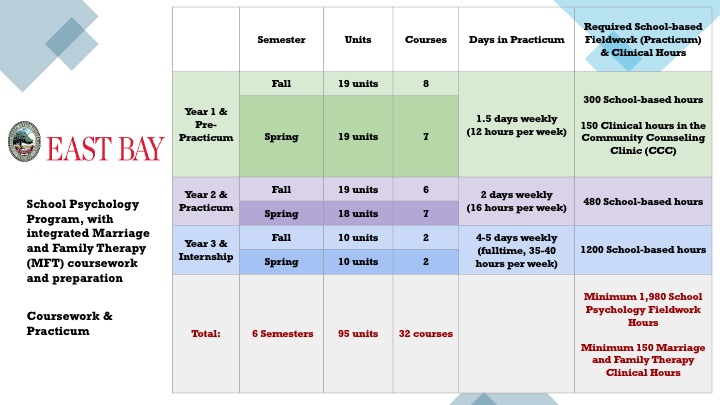
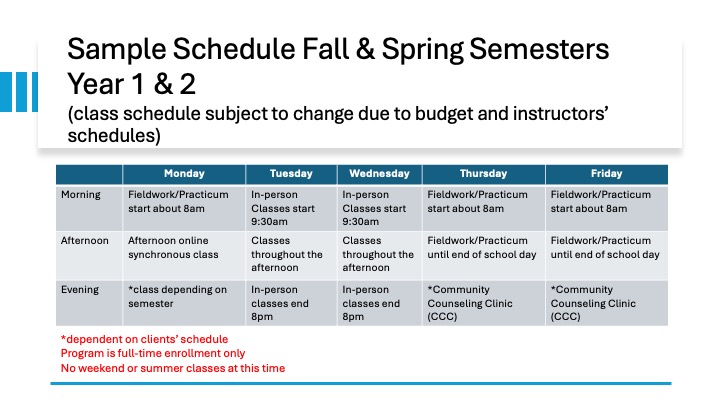
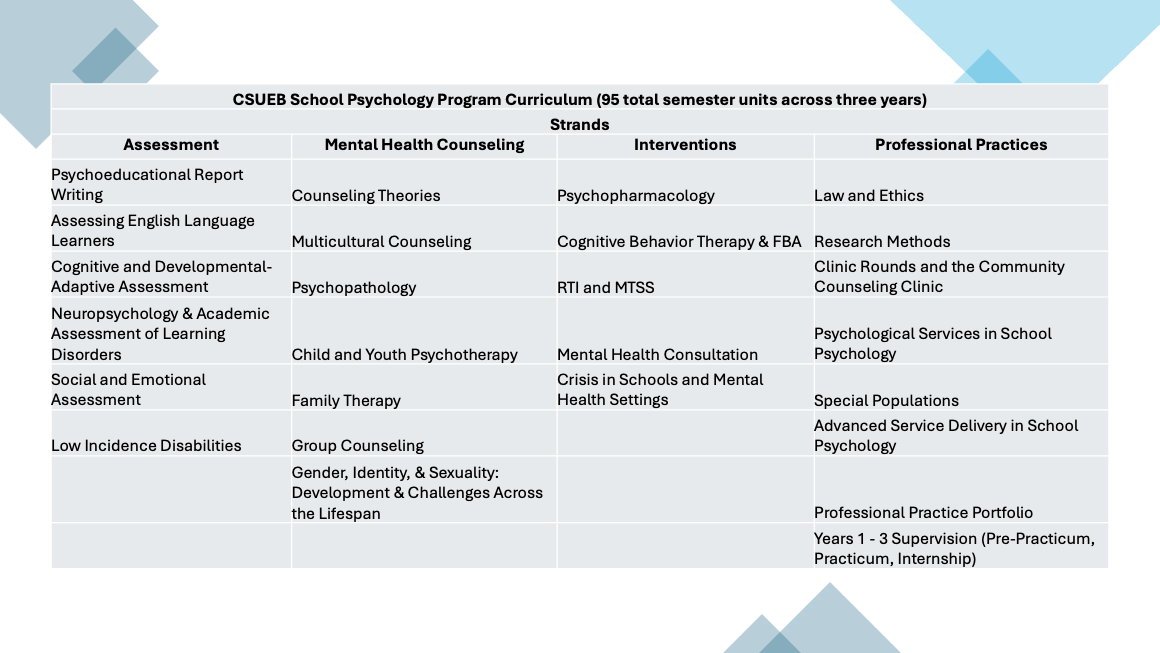
-
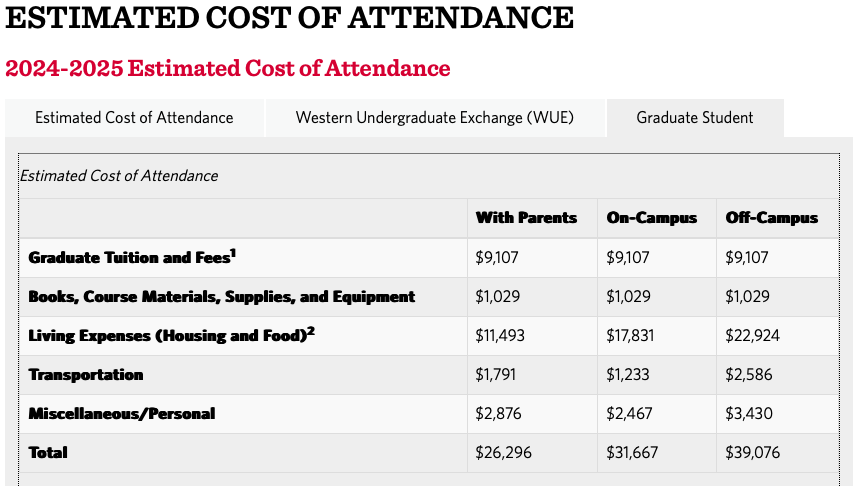
1 Based on 2024-2025 resident tuition and fees for full-time enrollment of 6 or more units for two semesters. Other expenses may vary. Amounts are subject to change without advance notice.
2 In accordance with California Assembly Bill 990, CSU East Bay provides the typical market costs of a one bedroom apartment in Hayward area. The room and Board expenses included in the off-campus cost of attendance represent the typical costs students pay when enrolled a CSU East Bay. Actual costs of room and board will vary, including on campus room and board depending on dorm and meal plan options. Many students living off-campus have roommates, which decreases their housing costs.
Non-resident Students (U.S. and Foreign)
Click Here for Nonresident Tuition Fee (in addition to basic tuition and system wide fees charged all students) for all campuses. The total nonresident tuition paid per term will be determined by the number of units taken.
-
Many of our students are funded through financial aid. Please refer to CSUEB Financial Aid website for scholarships and grants.
We have a one-time small scholarship called the Joshua Alper Impact and Equity Scholarship. This is awarded to program students after the first semester demonstrating satisfactory progress and commitment to social justice and equity work.
The Golden State Teacher Grant Program (GSTG) awards up to $20,000 to students currently enrolled in a professional preparation program approved by the Commission on Teacher Credentialing (CTC) and working towards earning their preliminary teaching or pupil personnel services credential. We are happy to announce that our School Psychology Program is included in the list of approved programs, making this opportunity available to our students.
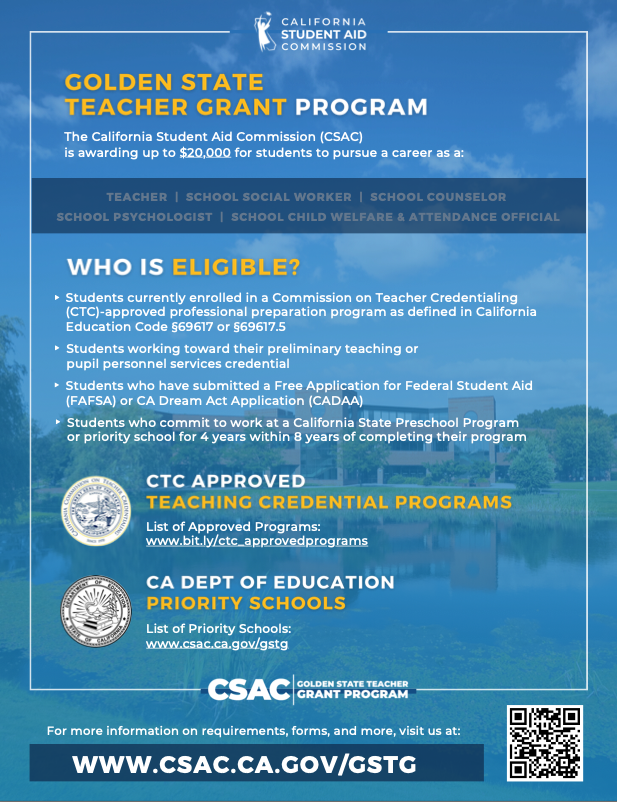
-
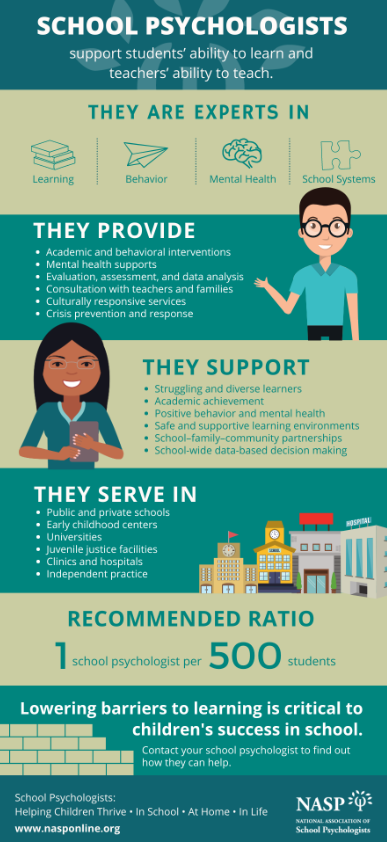
School psychology is a specialized field within psychology that focuses on the educational and psychological well-being of students in PK-12 educational settings. School psychologists work to support students' ability to learn and teachers' ability to teach by addressing the various psychological, behavioral, social, and academic issues that can affect a student's educational experience. Here are some key aspects of school psychology:
-
Assessment and Evaluation: School psychologists conduct assessments to identify students' academic strengths and weaknesses, cognitive abilities, emotional and behavioral functioning, and social skills. They use these assessments to develop individualized education plans (IEPs) and interventions.
-
Intervention: They provide direct interventions, such as counseling, social skills training, and crisis intervention, to help students overcome challenges. They also work with teachers and parents to implement strategies that support students' learning and mental health.
-
Consultation: School psychologists collaborate with teachers, parents, and administrators to develop effective strategies for managing classroom behavior, improving instructional methods, and creating safe and supportive learning environments.
-
Prevention: They develop and implement programs to prevent bullying, substance abuse, and other issues, and promote mental health and wellness among students.
-
Research and Program Development: School psychologists conduct research to identify effective educational practices and develop programs that address the needs of students, schools, and communities.
-
Advocacy: They advocate for students' needs and rights within the school system and work to ensure that all students receive appropriate support and services.
Overall, school psychologists play a crucial role in promoting the academic, social, and emotional success of students, helping to create positive and productive learning environments.
-
-
The state and national recognition status of the school psychology program that students attend
may well have an impact on state and national credentials that they qualify for upon graduation.
If a school psychology program is approved in the state in which it is located, students are likely
be able to practice in the public schools of that state upon completing the program. But if
individuals want to be credentialed in other states, or to attain national certification, it is
important that they attend a nationally accredited program. Such status indicates that external
experts have reviewed the program using national standards and suggests that the program
provides quality preparation.The graduates of programs that are recognized by NASP can be credentialed to work in the
schools in the majority of states (many of which either use NASP reviews to determine which
programs are state-approved or use NASP standards for their own state reviews). Additionally,
pending the passing of a national exam and documentation of an internship consistent with
NASP standards, the graduates of NASP-approved programs qualify for the Nationally Certified
School Psychologist (NCSP) credential. The graduates of programs that are not NASP-approved
may also apply for the NCSP, but they must submit considerably more documentation regarding
their preparation and are less assured of qualifying for the credential. (NASP) -
Differences in our Master’s Level and Specialist Level
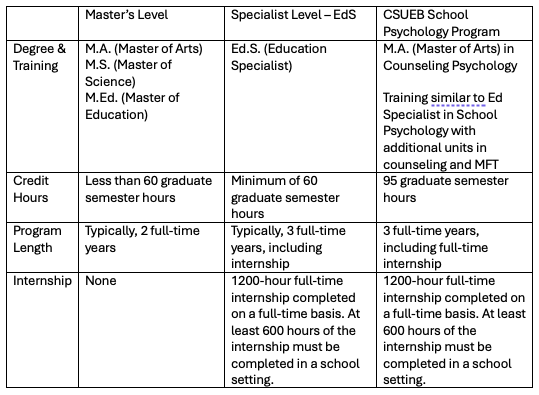
For more information on differences: see NASP.
Our Master's level training program is similar to an Ed.S. in School Psychology, featuring core training in school psychology and a full-time internship supervised by qualified and credentialed school psychologists at field sites. However, we require more units and an intensive program than typical Master's and Ed.S. programs due to our multidisciplinary training in counseling and marriage and family therapy.
-
Admission into programs leading to licensure and credentialing does not guarantee that students will obtain a credential. Licensure and Credentialing requirements are set by agencies that are not controlled by or affiliated with the CSU and requirements can change at any time. For example, Licensure and Credentialing requirements can include evidence of the right to work in the United States (e.g., social security number or tax payer identification number) or successfully passing a criminal background check. Students are responsible for determining whether they can meet licensure and credentialing requirements. The CSU will not refund tuition, fees, or any associated costs, to students who determine subsequent to admission that they cannot meet Licensure and credentialing requirements. Information concerning credentialing requirements is available from the California Commission on Teacher Credentialing (CTC). CTC-https://www.ctc.ca.gov/
-
1. Are there prerequisites to the program?
Prerequisites are considered foundational and preparatory courses for graduate-level work. Applicants must complete the following five courses or their equivalent with a grade of B or better prior to starting the fall semester:
- Theories of Learning Behavioral or Cognitive Psychology or Conditioning and Learning or Applied Behavior Analysis
- Statistics
- Abnormal Psychology
- Human, child, or Adolescent Development
- Psychological Tests OR Research Design
Please refer to the Prerequisite Equivalency Course List to determine if your past courses and/or courses from other institutions fulfill these requirements. This is not an exhaustive list; these are only examples.
If your institution or course is not listed, please contact the Program Coordinator for School Psychology: Dr. Oanh Tran - Email: oanh.tran@csueastbay.edu. Include a copy of the unofficial transcript, course description, course number, institution, and date completed.
2. Is the GRE required?
No, the GRE is not required. However, if you have taken the GRE and want to include the scores with your application, you can do so.
3. What if my GPA is below 3.0.
The minimum GPA requirement for the department is 3.0 to be competitive. However, we review applications holistically, and other aspects of your application can compensate for a low GPA. In your statement of purpose, please discuss any extenuating circumstances that contributed to your GPA.
4. Who should I ask for a letter of recommendation?
This is a professional environment; therefore, we are looking for references who can speak to your professional skills and abilities to succeed in graduate school and work with others. Ask professors, supervisors, and colleagues who can address these areas. At least one letter should come from someone in academia.
5. What is the difference between the school counseling and school psychology programs?
School Psychology: The specialization in school psychology authorizes the candidate to perform the following duties:
- Provide services that enhance academic performance.
- Design strategies and programs to address problems of adjustment.
- Consult with other educators and parents on issues of social development and behavioral and academic difficulties.
- Conduct psycho-educational assessment for purposes of identifying special needs.
- Provide psychological counseling for individuals, groups, and families.
- Coordinate intervention strategies for management of individuals and schoolwide crises.
School counseling: The specialization in school counseling authorizes the candidate to perform the following duties:
- Develop, plan, implement, and evaluate a comprehensive, data-driven school counseling program that includes academic, college/career, social-emotional, and mental health services.
- Advocate for the academic, college/career, social-emotional, and mental health needs of all applicants.
- Utilize school data to make informed decisions to address inequities in school.
- Provide schoolwide prevention and intervention strategies and counseling services.
- Provide consultation, training, and staff development to teachers and parents regarding applicants’ needs.
Our school psychology program is primarily in-person at the Hayward campus, with a few classes offered synchronous online. Courses follow a defined cohort sequence during the fall and spring semesters, starting 9:30am and can extend into the evening (8pm). Classes meet 2.5 to 3 days a week, with the remaining days dedicated to practicum/fieldwork and volunteering in our Community Counseling Clinic (CCC). If you are interested in an on-line program, this is not the program for you as most of our classes are in-person.
7. Can I apply to more than one MS Counseling program in the Educational Psychology Department?
No, you may only apply to one program at a time.
8. Do you offer a PPS Credential-only program for applicants who already have a Master’s degree?
No, we follow a cohort model in which candidates take the same sequenced courses together. Each course builds on the previous ones.
9. Can I work while being a student in the program?
The program is intensive in terms of time and coursework, so any outside employment is discouraged. Some students receive a small stipend from fieldwork districts during the second year, and most students receive a stipend from internship districts during the third year. Courses are offered from morning to evening, and when not in classes, candidates are in fieldwork. This is not a program for working professionals.
10. Are there graduate assistantships and/or graduate work-study positions available.
Paid positions are dependent on funding. Students are encouraged to contact the financial aid department and complete a Free Application for Federal Student Aid (FAFSA).
11. What happens if I can’t make it to one of the program informational sessions?
Information sessions provide an overview of our program, prerequisites, course of study, and application and interview process. We offer multiple sessions throughout the school year during the day and evening hours.
12. Can I apply with any Bachelor’s degree major and work/volunteer background?
Yes, we encourage candidates from all majors and work/volunteer backgrounds to apply. The degree must be from an accredited institution, and all program prerequisites must be completed prior to starting our program.
13. Where can I learn more about the profession?
Applicants can learn more about school psychology through the following resources: National Association of School Psychologists (NASP), CA Association of School Psychologists (CASP), CA Commission on Teacher Credentialing (CCTC), American Association for Marriage and Family Therapy (AAMFT), reading articles, attending conferences, webinars, and interviewing/shadowing school psychologists.
14. When and how will I be notified about an interview for the program?
Applications are reviewed on a rolling basis. Qualified applicants will be invited to interview with program faculty. Interviews are scheduled until the cohort is full. Depending on the quality of your application and applicant pool, applicants may hear back about an interview within a few weeks or months.
15. What is the program of study & evaluation process?
The MS in Counseling Psychology degree with a concentration in School Psychology, integrated with Marriage and Family Therapy, is a 95-unit program completed over 3-years (2 years of full-time course work and 1 year of 1200 hour internship). There is no option to select parts of the program. We are an integrated program with counseling, clinical, and school psychology coursework.
Candidates must satisfactorily complete all coursework and fieldwork requirements to be recommended for the degree and credential. Candidates are evaluated on their academic and fieldwork performance, clinical aptitude, and professional development in NASP/CTC standards.
16. Is there any advisor that I could speak to about the program?
Due to limited staffing, we do not offer individual meetings with prospective students. Please attend a zoom information session for Q&A and explore our website to learn more. Our website provides all the information you need about our program and application process. For specific questions regarding your application, you can contact the program coordinator, Dr. Oanh Tran (oanh.tran@csueastbay.edu).
17. Will you accept any transfer units from another institution?
Applicants for the school psychology program may be eligible to transfer up to 9 units from another institution, provided the candidate has completed graduate training in counseling or school psychology. We do no not accept any transfer units from the Bachelor’s level. Please contact Dr. Tran to inquire about transferring units.
18. Where can I obtain volunteer or job experience?
Students typically gain related experience working as substitute teachers, behavioral technicians, counselors with children/youth or summer camps, or teachers’ assistants. For volunteer experience, contact your local school to volunteer in the classroom, community library, or city programs. It is important for the experience to be in a professional setting in which individuals/supervisor/coworkers can observe your professional skills.
19. Where are field placements?
For candidates to be placed in a district or clinical setting, there must be an agreement (Memo of Understand, MOU). We have MOUs with districts across Northern CA and the San Francisco Bay Area, where candidates are primarily placed. In the first year, candidates are assigned to pre-selected districts and supervisors. In the second and third years, candidates attend a district recruitment career fair hosted by the program, where they can meet with recruiting districts. If there is no MOU, candidates may “pioneer” with new districts. A procedural process is available to support candidates in seeking new placements in which we have not had a placement.
20. How many applicants do you accept?
Admission to the school psychology program is highly competitive, with an acceptance rate of less than 20%. The number of students admitted is also dependent on the budget. Cohort size can range from 8 to 16 students. It is essential for applicants to follow the application requirements and submit all documents by the specified deadline. Applications with missing materials will not be reviewed.
21. What can I do if I have already completed my bachelor's degree and still need to complete prerequisites.
Prerequisites can be taken at any accredited college, university or online program. It is the responsibility of the applicant to research where prerequisites can be taken. If interested in taking prerequisites at CSUEB prior to fall admissions, applicants can enroll through Open University enrollment. Through Open University enrollment, applicants can enroll in undergraduate classes on a space available basis without the formal University process. These prerequisite courses are typically offered through the Psychology or Human Development departments. Contact these departments on when classes are offered.
22. Can prospective students enroll in program graduate courses?
No, program courses are for admitted students only. Anyone outside of the program, cannot enroll in our school psychology/MFT classes until being formally admitted into the program.
23. Can I transfer prior graduate coursework from another program?
Applicants with prior graduate training in counseling may be eligible to transfer up to two-three courses, subject to review and approval by the program coordinator. Eligible courses must be equivalent in content to those offered in our program and specifically related to counseling. Due to the cohort-based structure of our program—where shared coursework is central to student learning, development, and community building—transfer credit is limited.
Please note that school psychology-specific coursework is not eligible for transfer. This is because the program’s curriculum is designed to be sequential, with each course and fieldwork experience building upon the foundation established in prior coursework.
Applicants with prior graduate training must still meet all program prerequisites and application requirements.
24. What makes a strong applicant or application?
Strong applicants prepare in advance for the application process by doing their research on the program and application process, attending an information session, and learning about the profession. It is the prospective's responsibility to explore our website as there is an abundance of information available that can answer your questions. Please keep in mind that your questions to faculty can demonstrate your readiness in the application process and potential as a student in the program.
25. What makes an ideal candidate?
A candidate that possesses the following (ACUP): Aacademic excellence: good grades, strong academic performance; Ccommitment to social justice and diversity: shows dedication to social justice and diversity through advocacy work for vulnerable populations; Unique and relevant experiences: brings unique experiences that can enhance the curriculum, learning environment, and field of school psychology; Professional dispositions: exhibits strong professional dispositions, including empathy, self-awareness, integrity, flexibility, resourcefulness, leadership, collaborative-receptive mindset, and tolerance for ambiguity. ACUP are areas that are promoted and evaluated in the program.
